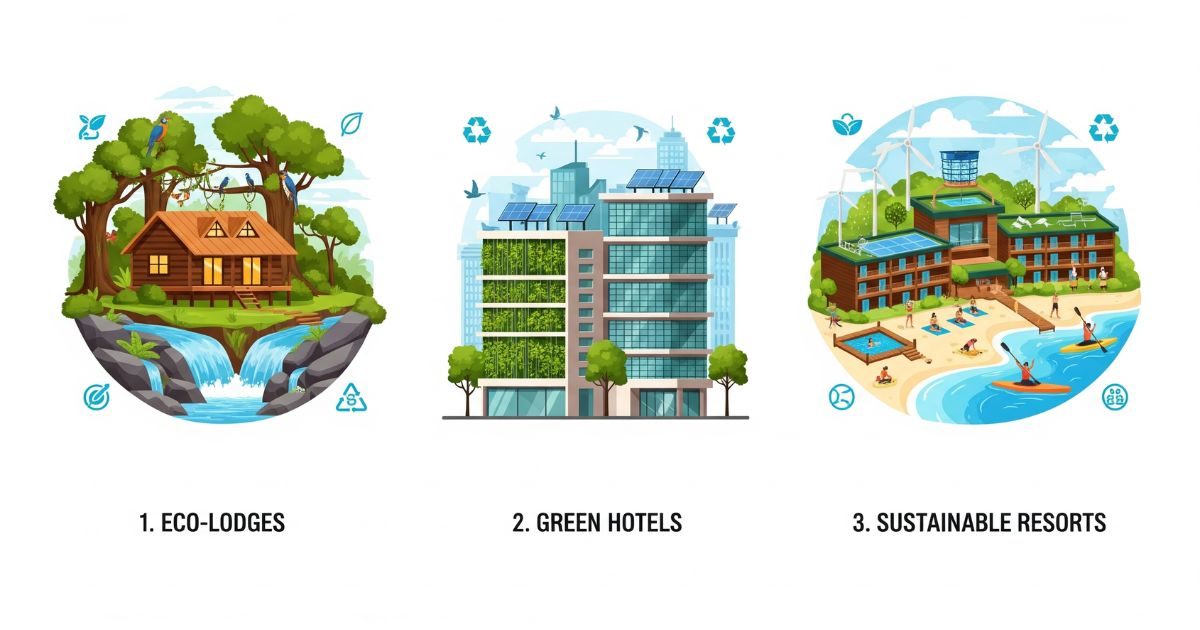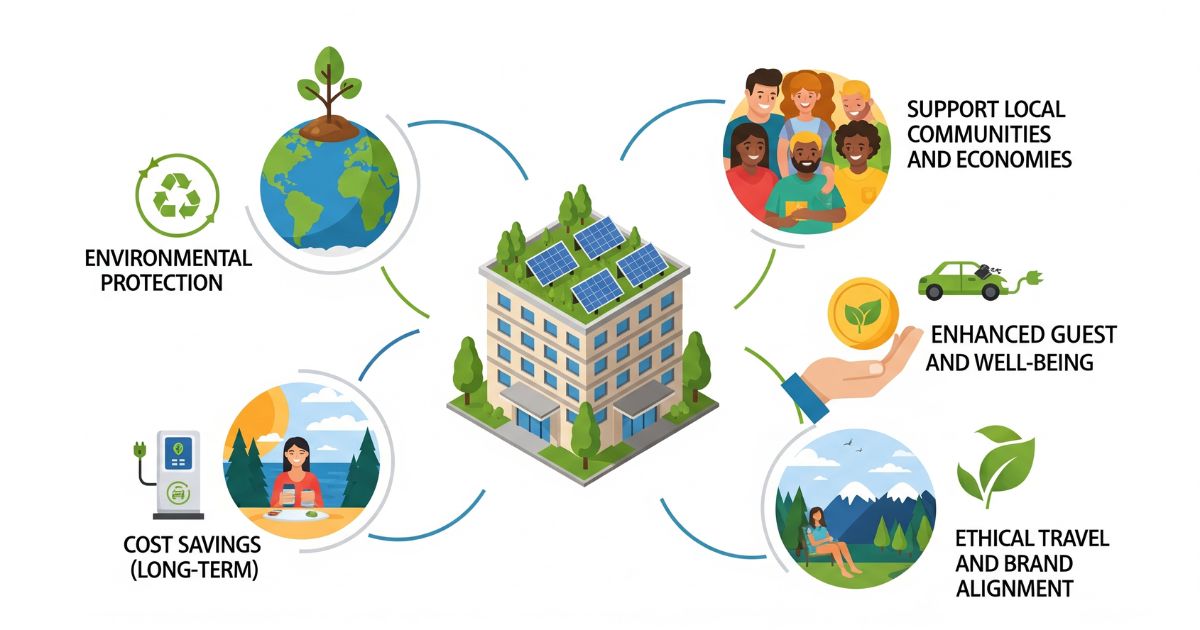
Travelers are increasingly seeking accommodations that align with their environmental values. This shift has created a thriving market for eco-friendly hotels and sustainable lodges that prioritize the planet without sacrificing comfort.
Sustainable accommodations go beyond simply placing recycling bins in rooms. They implement comprehensive green practices that reduce environmental impact while providing memorable experiences. From energy-efficient lighting systems to locally-sourced organic food, these properties demonstrate that luxury and sustainability can coexist.
This guide will help you identify genuine eco-resorts and understand what makes accommodations truly sustainable. You’ll learn about certification programs, green practices to look for, and discover some of the world’s leading sustainable lodging options.
What Makes Hotels Truly Eco-Friendly?
Authentic eco-friendly hotels implement multiple sustainable practices across their operations. These properties focus on reducing energy consumption, minimizing waste, and supporting local communities.
Energy efficiency forms the foundation of green accommodations. Properties use LED lighting, smart thermostats, and energy-efficient appliances to reduce power consumption. Many generate renewable energy through solar panels or wind turbines on-site.
Water conservation plays an equally important role. Sustainable accommodations install low-flow fixtures, implement greywater recycling systems, and encourage guests to reuse towels and linens. Some properties even collect rainwater for irrigation purposes.
Waste reduction strategies include composting programs, eliminating single-use plastics, and partnering with local recycling facilities. The most committed properties achieve zero-waste-to-landfill status through comprehensive waste management programs.
Key Certifications for Sustainable Accommodations
Several certification programs help travelers identify legitimate eco-friendly hotels. These third-party assessments ensure properties meet strict environmental standards.
LEED certification represents the gold standard for green buildings. Properties earning LEED status demonstrate excellence in energy efficiency, water conservation, and sustainable materials usage. The certification includes different levels: Certified, Silver, Gold, and Platinum.
Green Key certification focuses specifically on hospitality properties. This program evaluates accommodations based on 13 criteria, including energy efficiency, water conservation, and waste management. Properties must undergo annual inspections to maintain their certification.
EarthCheck provides another respected certification for sustainable tourism properties. This program uses scientific benchmarking to measure environmental performance and requires continuous improvement over time.
Sustainable Practices to Look For
When booking accommodations, several green practices indicate genuine environmental commitment. These features demonstrate a property’s dedication to responsible tourism.
Look for hotels that source organic food locally. This practice reduces transportation emissions while supporting regional farmers and communities. Many eco-resorts maintain their own gardens to supply fresh produce for their restaurants.
Energy-efficient systems should be visible throughout the property. This includes LED lighting, programmable thermostats, and Energy Star-rated appliances. Properties may also feature smart systems that automatically adjust lighting and temperature based on occupancy.
Water conservation measures extend beyond basic fixture upgrades. Advanced properties implement greywater systems that treat and reuse water for irrigation. Some hotels feature native landscaping that requires minimal watering.
Transportation options reveal another layer of environmental consideration. Look for properties offering electric vehicle charging stations, bicycle rentals, or shuttle services using hybrid or electric vehicles.
Types of Green Accommodations

Eco-friendly accommodations come in various forms, each offering unique sustainable features and experiences. Understanding these different types helps travelers choose options that match their preferences and values.
Eco-Lodges
Eco-lodges typically feature smaller footprints and intimate connections with natural environments. These properties often use locally-sourced building materials and renewable energy systems. Many eco-lodges offer educational programs about local ecosystems and conservation efforts.
Green Hotels
Urban green hotels integrate sustainable practices into traditional hospitality settings. These properties might feature rooftop gardens, sophisticated energy management systems, and partnerships with local environmental organizations. They prove that sustainable lodging works in city environments.
Sustainable Resorts
Large-scale eco-resorts demonstrate how luxury and sustainability can coexist. These properties often feature extensive renewable energy systems, on-site water treatment facilities, and comprehensive waste management programs. Many invest heavily in local community development and conservation projects.
Regional Leaders in Sustainable Lodging
Different regions have pioneered various approaches to sustainable accommodations, creating models that others can follow.
Costa Rica leads in eco-lodge development, with properties like Nayara Gardens and Pacuare Lodge setting international standards. These accommodations balance luxury amenities with minimal environmental impact while supporting local conservation efforts.
Scandinavia excels in energy-efficient hotel design. Properties throughout Norway, Sweden, and Denmark showcase innovative building techniques and renewable energy integration. The region’s cold climate has driven creative solutions for sustainable heating and insulation.
Australia’s eco-resorts demonstrate water conservation excellence. Properties in water-scarce regions have developed sophisticated recycling systems and drought-resistant landscaping that other destinations are now adopting.
Benefits of Choosing Sustainable Accommodations

Selecting eco-friendly hotels creates positive impacts that extend far beyond individual travel experiences. These benefits affect local communities, environments, and the broader tourism industry.
Environmental benefits include reduced carbon footprints, decreased water usage, and minimized waste generation. Properties implementing comprehensive sustainable practices can reduce their environmental impact by 20-30% compared to conventional accommodations.
Economic advantages support local communities through job creation and supply chain partnerships. Sustainable accommodations often source products and services locally, keeping tourism revenue within destination communities.
Cultural preservation becomes possible when eco-resorts partner with local communities. These relationships help maintain traditional practices while providing economic incentives for cultural continuation.
Guest experiences often improve at sustainable properties. Travelers report higher satisfaction rates at hotels implementing green practices, citing better air quality, healthier food options, and meaningful connections with destinations.
How to Find and Book Green Accommodations
Several strategies help travelers identify and book authentic, eco-friendly accommodations. These approaches ensure you find properties that match your sustainability standards.
Use specialized booking platforms that focus on sustainable travel. Websites like BookDifferent and Green Pearls curate collections of certified eco-friendly properties. These platforms provide detailed information about each property’s sustainable practices.
Research certification programs before booking. Look for properties displaying recognized certifications like LEED, Green Key, or EarthCheck logos. Verify these certifications directly with the issuing organizations when possible.
Read property websites carefully to understand their specific sustainable practices. Genuine eco-friendly accommodations provide detailed information about their environmental initiatives, community partnerships, and conservation efforts.
Contact properties directly with sustainability questions. Ask about specific practices like renewable energy usage, water conservation measures, and waste management programs. Properties committed to sustainability welcome these inquiries.
Making Your Stay More Sustainable
Travelers can enhance the positive impact of their accommodation choices through conscious behaviors during their stays. These actions support property sustainability efforts while reducing personal environmental footprints.
Participate in towel and linen reuse programs. This simple action significantly reduces water consumption and chemical usage associated with frequent washing. Many properties donate savings from these programs to environmental causes.
Minimize energy consumption by turning off lights, air conditioning, and electronics when leaving rooms. Use natural lighting when possible and adjust thermostats to reasonable temperatures.
Support on-site sustainability initiatives by dining at property restaurants featuring local organic food. Choose accommodations offering refillable water bottles rather than purchasing single-use plastics.
Engage with educational programs offered by eco-resorts. These activities enhance travel experiences while supporting conservation awareness and local community development.
Your Next Sustainable Adventure Awaits
Choosing eco-friendly accommodations represents a powerful way to align travel experiences with environmental values. These properties prove that comfort, luxury, and sustainability can coexist while creating positive impacts for destinations and communities.
The growth of sustainable lodging options means travelers no longer need to compromise between environmental responsibility and memorable experiences. From intimate eco-lodges to luxury green resorts, options exist for every travel style and budget.
Start planning your next sustainable adventure by following this Sustainable Hotels guide. Research certified green hotels in your desired destination and use the practices and certifications outlined in this guide to identify properties that match your values and create meaningful travel experiences.

















No Comments